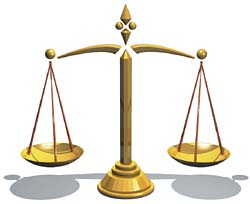- Home
- /
- UAlbany News
- /
- Release
- /
UAlbany Report: Equal Representation in Nation�s Federal and State Judiciary Eludes Women
Contact(s): Catherine Herman (518) 956-8150
 |
A new study by the Center for Women in Government & Civil Society says that women make up 22 percent of all federal judges and 26 percent of all state level positions. |
ALBANY, N.Y. (January 29, 2010) -- Equal representation of women on the nation�s federal and state judicial benches remains elusive, a University at Albany study has found.
A report by UAlbany's Center for Women in Government & Civil Society (CWGCS), of the Rockefeller College of Public Affairs and Policy, finds that nationwide women make up 22 percent of all federal judges and 26 percent of all state level positions. Thirteen states fell below the 20 percent mark in the overall state judgeships filled by women. While no state has achieved equality in state-level judgeships, eight states have achieved a threshold of 33 percent women, the study found.
�The 33 percent threshold is important because it is the point where women become a critical mass and where their number is large enough to induce change in the normative conception of leadership and to exercise meaningful influence on the cultural norms which stereotype women�s roles," said Dina Refki, director of CWGCS.
The report finds only two states - New Jersey and Connecticut - achieved critical mass of 33 percent of women's share of federal judgeships. In most states, women make up approximately 20 percent of federal judgeships. Women's share of the federal bench is at 10 percent or less in eight states, and women judges are nearly absent from the federal courts of Montana and New Hampshire. New York is tied for 14th place in women on the state benches, and 18th in the nation for the number of women in federal judgeships.
The report also points out that pockets of disparities exist within states. In New York State's Northern District, a 26-county region, fifteen District and Magistrate judges serve on the bench. None of them are women despite a qualified pool of 359 women judges serving on state-level benches in New York, the report outlines.
"While New York ranks 18 among other states, and the share of women in federal judgeships is at 24.6 percent statewide, this masks the realities of disparities in its Northern District," Refki said.
The report indicates that the gap cannot be attributed to a lack of women who are qualified to serve on the bench -- nationally women comprise 48 percent of law school graduates and 45 percent of law firm associates, according to the American Bar Association. The gap can be attributed to the lack of opportunity and access afforded to women at the federal level, the report says.
The study used two sources: the 2010 edition of "The American Bench: Judges of the Nation" produced by Foster and Lang, and data provided by the Federal Judiciary History Office.
The Center for Women in Government & Civil Society is a cornerstone of women's leadership development, an academic research center, and a policy think tank which generates knowledge and provides analysis on issues facing women and girls.
![]() For more news, subscribe to UAlbany's RSS headline feeds
For more news, subscribe to UAlbany's RSS headline feeds
Educationally and culturally, the University at Albany-SUNY puts "The World Within Reach" for its 18,000 students. An internationally recognized research university with 58 undergraduate majors and 128 graduate degree programs, UAlbany is a leader among all New York State colleges and universities in such diverse fields as public policy, nanotechnology and criminal justice. With a curriculum enhanced by 300 study-abroad opportunities, UAlbany launches great careers. For more information about this globally ranked University, visit www.albany.edu. For UAlbany's extensive roster of faculty experts, visit www.albany.edu/news/experts.shtml.


